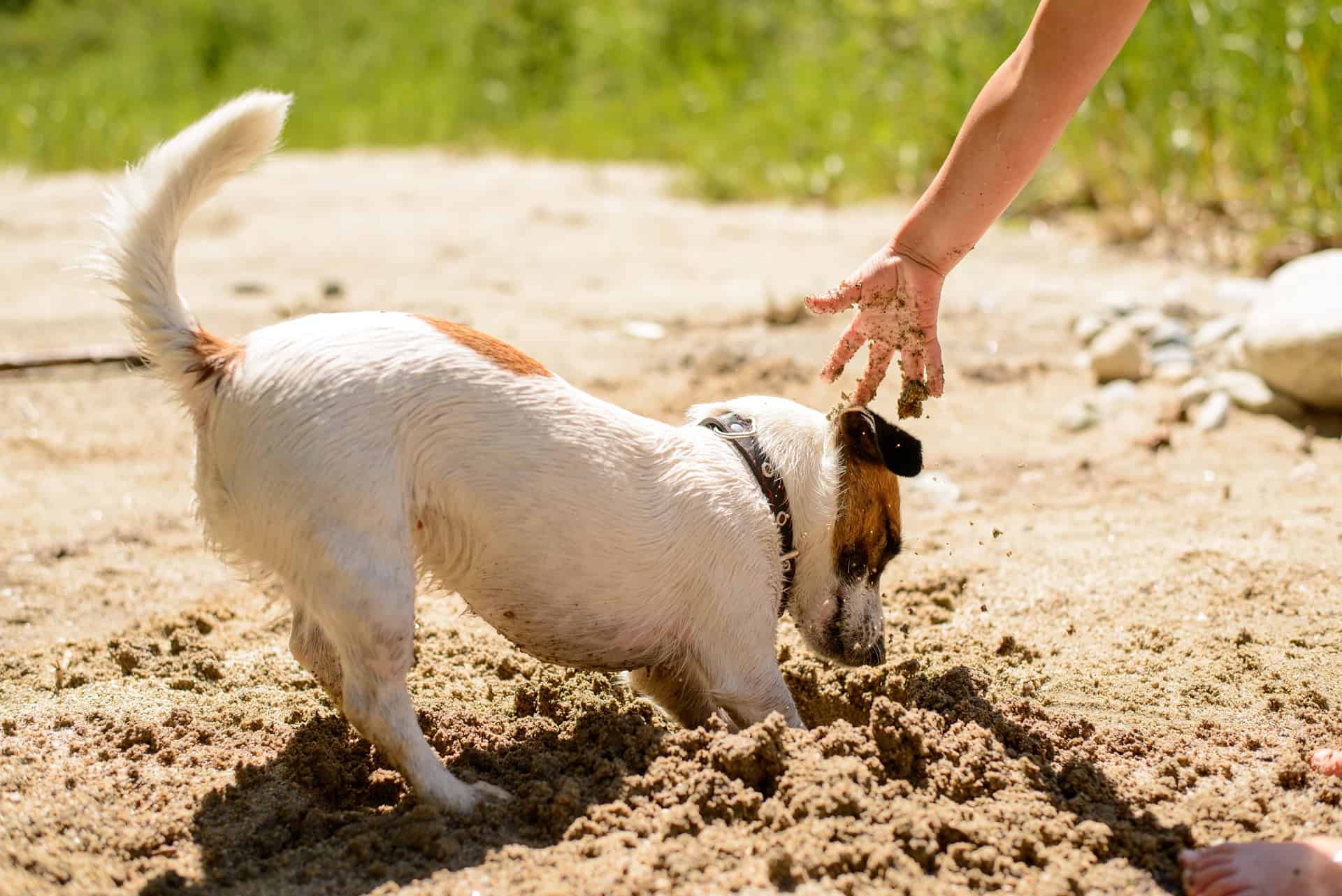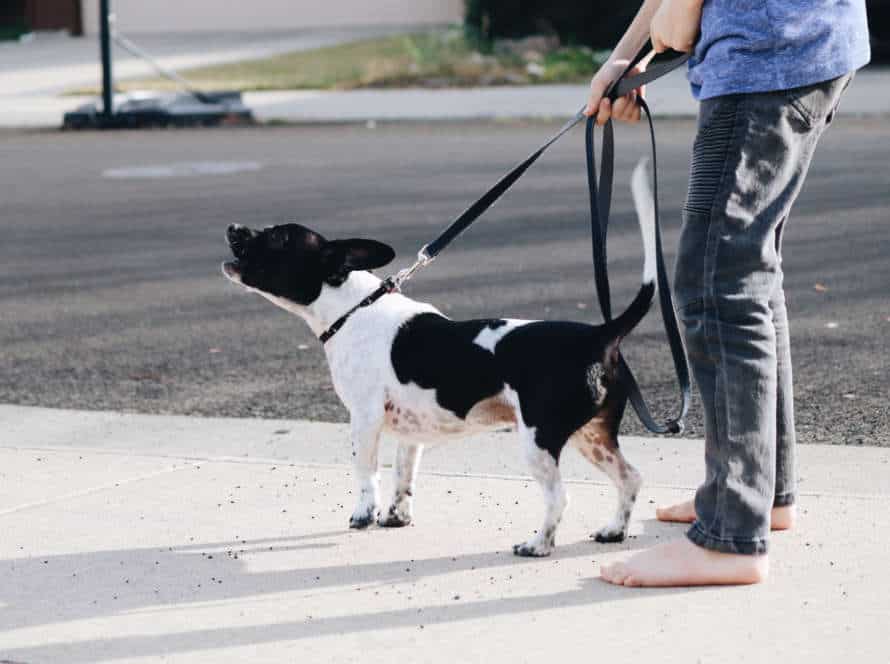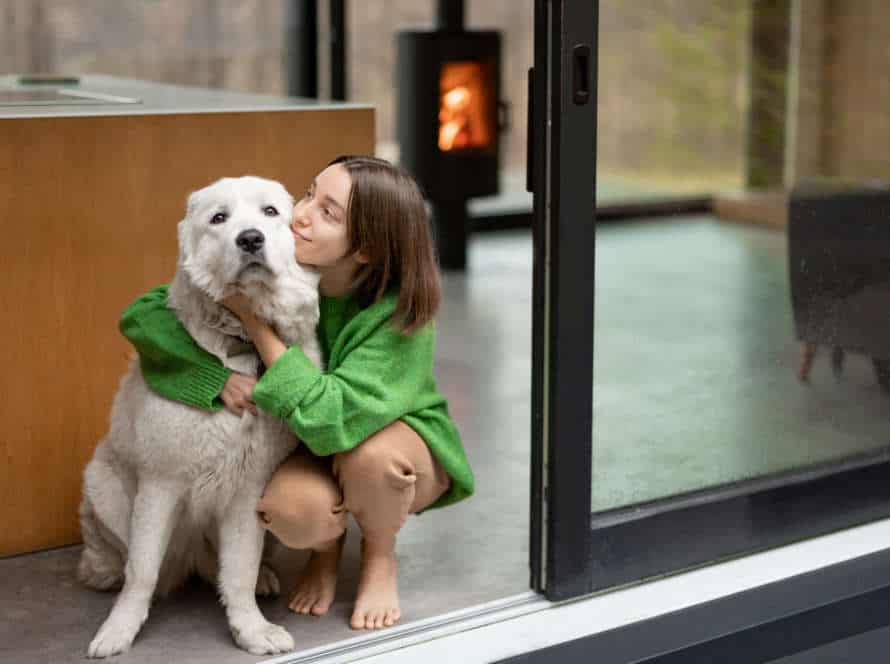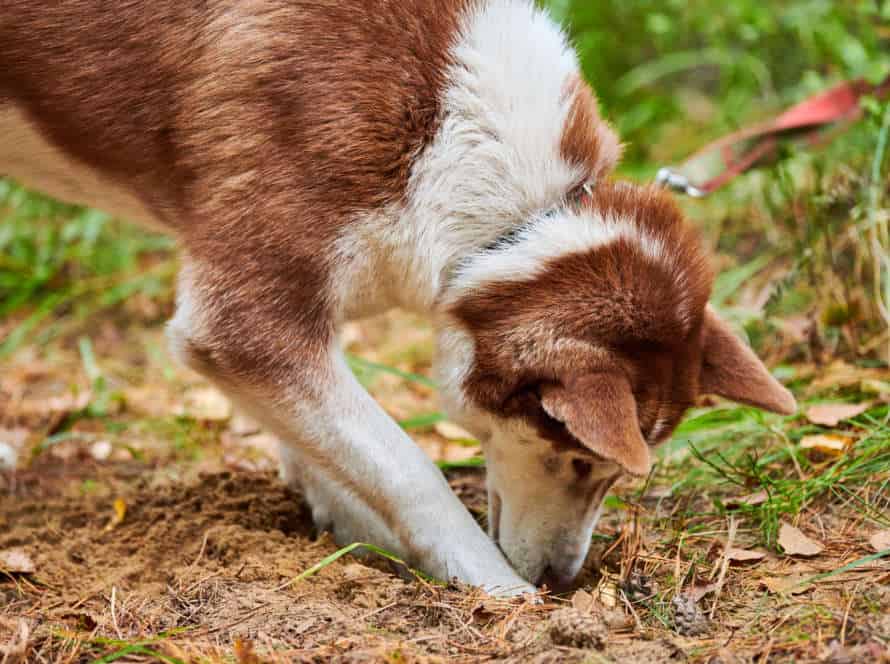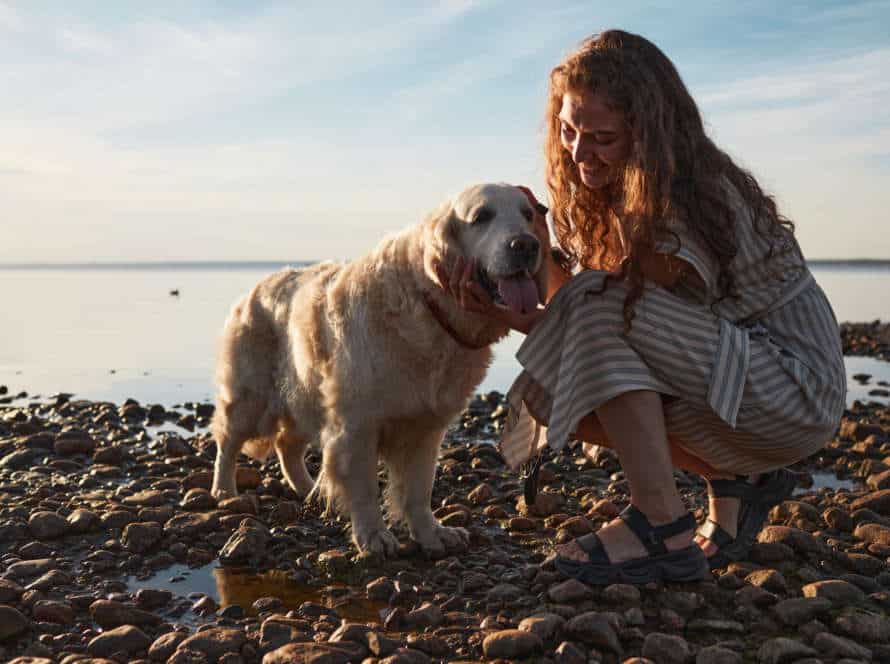Puppy Training: Preventing Digging Issues Before They Start
Digging is a natural thing for puppies, but it can become detrimental if not dealt with. Here are some tips to avoid digging issues in puppy training:
- Give your pup a designated digging area. Teach them to use it by burying toys, treats, or bones.
- Keep an eye on your pup when they are playing outside. Direct any digging to the designated area.
- Make sure your pup gets enough exercise and stimulation to avoid boredom.
- If your pup starts to dig in the wrong place, say “no” firmly and direct them to the correct spot.
By following these steps, you can keep digging from becoming a destructive habit for your pup.
Understanding Why Puppies Dig
Digging is an instinct for pups, to explore and express. It can be a problem when they make holes in your yard or furniture. To stop this before it starts, it’s key to know why puppies dig. Grasping the reasons behind this behavior can help you manage it correctly.
Instinctual behaviors
Digging is an instinctive behavior for puppies. It serves several functions, like finding food, getting a shelter and controlling body temperature. Knowing why puppies dig is essential to stop any digging problems before they arise, and training your puppy properly.
These are the reasons why puppies dig:
- Comfort: Digging a hole to lay in can make puppies feel better if they’re too hot or too cold.
- Stress Relief: Digging can be an outlet for extra energy and a way to reduce stress or boredom.
- Hiding Objects: Some puppies may dig and bury items like toys or bones for later.
- Attention-Seeking: Puppies who don’t get enough attention may use digging to get your attention.
To prevent any digging issues, give your puppy enough activities like exercise, training, and toys to keep them engaged and happy.
Boredom and anxiety
Digging is a natural activity for puppies. It can be a way to have fun, or to relieve stress from boredom and anxiety.
There are some potential reasons why puppies dig:
- Seeking attention
- Hunting instincts
- Trying to escape or find shelter
- Feeling cold or hot.
To stop digging issues before they begin, give your puppy enough exercise and brain stimulation. Give them interactive toys and do regular training. Also, decide an area in your yard and let your puppy dig there. Supervise them when they go outside until they learn the boundaries. Lastly, discourage unwanted digging with positive reinforcement and redirection, instead of punishment. With patience and consistency, you can help your puppy learn the right behaviors and live a happy and healthy life.
Specific breeds that are prone to digging
Digging is a common behavior in puppies! Certain breeds are more likely to do it than others. Here’s a list:
- Terrier Breeds: Jack Russell Terriers and Wire Fox Terriers were bred to hunt underground. Digging comes naturally to them.
- Hounds: Beagles and Basset Hounds dig to follow scents and explore.
- Dachshunds: They have long claws and strong front legs, so digging is easy and fun!
Why do puppies dig? It could be because of boredom, stress, anxiety, searching for prey, or staying cool in hot weather. To stop them from digging, give them enough exercise and mental stimulation. Provide toys and chew items to keep them busy. Create a special digging area in your yard with the right soil and toys.
Preventing Digging Behaviors
Puppy owners, do not despair! There are plenty of ways to keep your pup from digging. Begin training straight away and take preventive action, before the digging begins. This article will help you do just that.
Supervision and confinement
It’s vital to supervise and contain your pup to stop digging habits from starting. Puppies, like kids, can be mischievous and destructive when unsupervised. Here’s how to prevent this:
- Supervise the puppy when it’s outside and give it plenty of exercise and playtime for it to tire out.
- Use a fence or barrier to restrict the puppy to a particular area of your yard.
- Provide the pup with chew toys and bones to fulfill its natural urge to chew.
- Train the puppy not to dig by using positive reinforcement techniques and shifting its attention to other activities.
- If you spot the puppy digging, distract it with a loud noise or a non-verbal cue, then re-direct its focus elsewhere.
Remember: Consistency is essential in stopping digging behaviors in puppies. Set definite rules and always reward good behaviors.
Providing alternate activities
Dogs dig for various reasons, such as boredom, anxiety, temperature regulating, or trying to escape. To prevent this behavior, alternate activities are great. Here’re some ideas:
- Provide chew toys – like rubber toys, ropes, or bones. Chewing will distract them from digging.
- Interactive toys – like treat-dispensing ones – are another way to keep your puppy entertained and mentally stimulated.
- Playtime – Chase, fetch, and other games – will provide physical and mental stimulation.
Pro tip: Dogs need supervision to stop digging. When you catch them starting, calmly say “No” and redirect their behavior to one of these alternate activities.
Creating a digging space
Pups can be prone to digging, which can harm your garden and lawn. Making a designated digging place is an awesome way to stop digging behaviors in puppies and show them where it’s alright to dig.
Here are the steps to take:
- Select a spot in your yard where it’s alright for your pup to dig.
- Employ a strong frame, such as wooden boards or garden timbers, to make a definite boundary around the digging place.
- Fill the space with loose or sandy soil and hide some toys or treats to prompt your pup to dig in this area.
- Whenever you observe your pup digging outside the assigned area, direct their attention to the digging space and use positive reinforcement methods to reward them for digging there instead.
- In time, your pup will understand that digging in the designated area is the only acceptable behavior, and they will be less likely to ruin other parts of your yard.
Redirecting Digging Behaviors
Digging is a hassle for many puppy owners. Fortunately, it can be stopped with the proper training and understanding. Why do puppies even dig? Knowing that helps you direct the behavior better. We’ll share some strategies to stop digging before it starts.
Positive reinforcement and reward-based training
Positive reinforcement and reward-based training is a great way to redirect digging behaviors in puppies. The goal is to make digging less rewarding and offer positive experiences for desirable behaviors. Here’s how:
- Give your pup enough playtime and exercise to avoid boredom and anxiety.
- Make a designated digging area in the yard and entice your pup to dig there. Bury a toy or treat for them to find.
- Use praise, treats, and playtime to reward your pup when they dig in the right spot.
- When your pup starts to dig in an undesired area, call them to you and give them a positive experience.
Consistent training and patience will help your pup develop healthy habits and prevent destructive digging.
Discouraging digging with correction-based training
Discourage pup-digging with correction-training. It’s a good way to redirect their behavior, and stop digging problems before they start. Here are tips to help:
- Positively reinforce good behavior with play and commands. Praise and cuddle your pup to encourage good behavior.
- Catch them “in-the-act” and use verbal commands like “no” or “bad dog“. Show them where to dig, like a sandbox or designated area.
- Put deterrents like lemon juice, cayenne pepper, or dog-specific products in certain spots to stop digging.
- Give plenty of exercise and mental stimulation. This stops boredom and reduces the urge to dig.
- Correction-training is a last resort and must be done calmly. Redirect behavior, don’t punish. Pro Tip: Be patient and consistent for best results.
Using deterrents
If your pup is a digger, don’t punish them. Instead, redirect their behavior with the help of deterrents. Here are some tips:
- Provide a designated digging area – like a sandbox.
- Use cayenne pepper or vinegar to prevent digging where it’s not allowed.
- Remove loose soil & cover the ground with rocks or mulch.
- Supervise your pup in areas where they could dig. Reward them for good behavior!
Tips for Success
Puppy training? Prevention is key! Teach your pup boundaries and don’t let them dig. Here are some tips to help you successfully train your puppy, so you don’t have to deal with digging issues later. Early training is the best!
Consistency is key
Consistency is the secret to success when it comes to puppy training and avoiding digging problems. Here are some tips for setting up a steady routine:
- Create clear rules and boundaries for your puppy from the start.
- Exercise and give them mental stimulation to keep them content and busy.
- Monitor your pup when they are outdoors to stop them digging in wrong places.
- Guide their digging behaviour to an appropriate area or give them special digging toys.
- Stay patient and be consistent with your training. It might take time for your pup to learn, but staying consistent is necessary for success.
Keep to these steps and stay consistent in puppy training – and you’ll avoid digging problems and have a great relationship with your furry pal!
Start training early
Begin training your furry pal right away to dodge digging issues before they even begin! Consistency and positive reinforcement are the secret to successful puppy training. Here are some tips to help you:
- Give your pup lots of exercise to stop boredom and restlessness.
- Have a special digging area for your pup, like a sandbox or a corner in your yard.
- Train your pup to just dig in the special area. Reward them when they do and guide them when they don’t.
- Use positive reinforcement like praising, treats, and toys when your pup sticks to the designated digging area.
- Keep an eye on your pup when they are outside and don’t let them dig in the wrong areas.
Pro Tip: Never forget that patience and consistency are essential when puppy training. With time and effort, you can train your furry friend to be a good-mannered and cheerful buddy.
Practice patience and positive reinforcement
Training puppies can be hard. But with patience and rewards, you can stop bad behaviours such as digging. Here are some tips to begin preventive training:
- Give your pup toys and chews to move their energy and focus away from digging.
- Motivate your puppy to play and exercise often to stop boredom that could cause digging.
- Make a specific digging spot in your garden and reward good behaviour if they use it.
- If you see your pup digging in the wrong place, calmly guide them to the right spot.
- Always give them rewards for good behaviour and precautions to stop digging.
Seeking Professional Help
Having trouble with a pup that digs? Seek help from a professional dog trainer! They can discover why the pup is digging and provide clear instructions for correcting the behavior. Plus, they can give advice on how to keep the pup from digging again and help you make a consistent routine for the pup to follow.
When to seek professional help
If your pup’s persistent digging is causing destruction, it’s time to call in a pro. Here are the signs:
- Your pup’s digging is hurting property or people.
- All your efforts to stop the digging are futile.
- You feel frustrated with training.
A dog trainer can find out why your pup is digging and create a plan just for them. Don’t wait too long – getting help early can stop the digging from becoming a habit.
Choosing a reputable dog trainer or behaviorist
Picking a trustworthy dog trainer or behaviorist can be intimidating. But, it’s important to find a person who knows a lot about training pooches and solving any behavioral problems. Here’re some stuff to think about when selecting a dog trainer/behaviorist:
- Credentials: Look for people with certifications from official organizations, like the Certification Council for Professional Dog Trainers or the International Association of Animal Behavior Consultants.
- Experience: Pick someone who’s had a lot of success working with dogs like yours.
- Methods: Check out the trainer’s techniques to make sure they fit with your beliefs.
- Reviews: Read what other pet owners have said to get a feel for their reputation and success rate.
- Price: Make sure their fee fits your budget.
Recall that an awesome trainer/behaviorist should not only train your doggy but also teach you how to continue the training at home.
Working with your dog’s specific needs and behaviors.
Working with your pup’s particular needs and behaviors is very important in training them. This means preventing any digging issues before they start. Professional help can make sure you give your pup the right instructions and that their individual needs are met.
Here are some tips to avoid digging problems:
- Give your pup plenty of exercise and activities to keep them from being bored.
- Designate a spot for your pup to dig and train them to use it.
- Provide alternative things to chew and play with.
- If your pup digs where they shouldn’t, redirect them to their special spot.
- Professional help is key to make sure you use the right techniques and meet your pup’s individual needs. A well-trained and cared-for pup will lead to a happy and healthy relationship with your furry friend.
Frequently Asked Questions
Q: What are some common reasons why puppies dig?
A: Puppies may dig for a variety of reasons, including boredom, lack of exercise, exploration, or anxiety.
Q: How can I prevent my puppy from digging in the first place?
A: Providing plenty of exercise, toys, and attention can help prevent boredom and anxiety that can lead to digging. Additionally, providing a designated digging area and actively supervising your puppy’s behavior can help prevent unwanted digging.
Q: What should I do if my puppy starts digging in the wrong area?
A: Redirecting your puppy to a designated digging area can be helpful in preventing digging in unwanted areas. Consistency and positive reinforcement for desirable behavior can also be effective in preventing unwanted digging.
Q: Are there any tools or products that can help prevent digging?
A: Products such as dog repellent sprays, motion-activated sprinklers, and digging barriers can be effective in preventing unwanted digging behavior. However, it is important to note that training and management strategies should still be used in conjunction with these products.
Q: Should I punish my puppy for digging?
A: No, punishment should not be used to address unwanted digging behavior. Punishing your puppy can lead to increased anxiety and can worsen the behavior. Instead, positive reinforcement for desirable behavior can be used to address unwanted digging.
Q: When should I seek professional help for my puppy’s digging behavior?
A: If your puppy’s digging behavior is causing significant damage to your property or is causing harm to the puppy or others, it may be necessary to seek professional help from a certified dog trainer or behaviorist.

